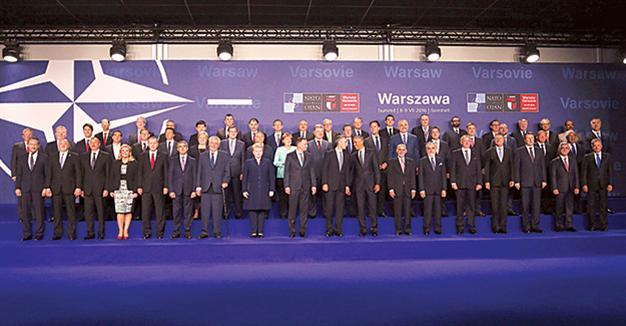NATO focuses on Russia, terrorism at key summit
WARSAW

Leaders of the NATO military alliance gathered July 8 to order ambitious actions against a daunting array of dangers to the security of their nations and citizenry, including a rearmed and increasingly unfriendly Russia to Europe’s east and violent terrorism to the south.
“The decisions we’re going to take together will once again confirm that Europe and North America stand together, act together to support all allies against any threats,” NATO Secretary-General Jens Stoltenberg said, predicting a “landmark summit” meeting of U.S. President Barack Obama and other heads of state and government.
After arriving in Warsaw, Obama announced the U.S. would send an additional 1,000 U.S. troops to Poland as part of a NATO effort to reinforce its presence on the alliance’s frontiers near Russia. He met with Polish President Andrzej Duda, and hailed Poland as “a lynchpin in the defense of NATO’s eastern flank.”
In an op-ed published in the Financial Times, Obama called on NATO to stand firm against Russia, terrorism and other challenges.
He also called on partners to “summon the political will, and make concrete commitments” to strengthen European cooperation after the British people’s vote in June to leave the European Union.
Stoltenberg said that for NATO’s 28 member nations to be safe, they do not only need to reinforce their own armed forces, but to come to the aid of partner nations in the Middle East and North Africa menaced by extremist violence.
“For our nations to be safe, it’s not enough to keep our defenses strong, we must help to make our partners stronger,” Stoltenberg said.
“Training local forces is often our best weapon against violent extremism,” Stoltenberg told a pre-summit forum of defense and security experts. Among the items on the NATO meeting’s ambitious agenda is increased assistance for Iraq’s military, extension of the West’s financial commitment to the Afghan military and police, aid for Tunisia, and getting NATO more involved in the campaign against the Islamic State of Iraq and the Levant (ISIL) by authorizing use of AWACS surveillance planes to assist the U.S.-led coalition fighting the group.
In Warsaw, NATO heads of state and government will also formally order deployment of multinational units on the alliance’s eastern borders.
“Today, we will agree to enhance our forward presence in the east of the alliance. In Estonia, Latvia, Lithuania, and here in Poland,” Stoltenberg said.
“We will deploy, by rotation, a robust, multinational battalion in each of the countries. Making clear that an attack against one ally will be met by forces from across the alliance,” he added.
The action is vigorously opposed by the Kremlin. But German Defense Minister Ursula von der Leyen on July 8 called it an appropriate measure to counter what she called a “completely unpredictable and aggressive Russia.”
 Leaders of the NATO military alliance gathered July 8 to order ambitious actions against a daunting array of dangers to the security of their nations and citizenry, including a rearmed and increasingly unfriendly Russia to Europe’s east and violent terrorism to the south.
Leaders of the NATO military alliance gathered July 8 to order ambitious actions against a daunting array of dangers to the security of their nations and citizenry, including a rearmed and increasingly unfriendly Russia to Europe’s east and violent terrorism to the south.